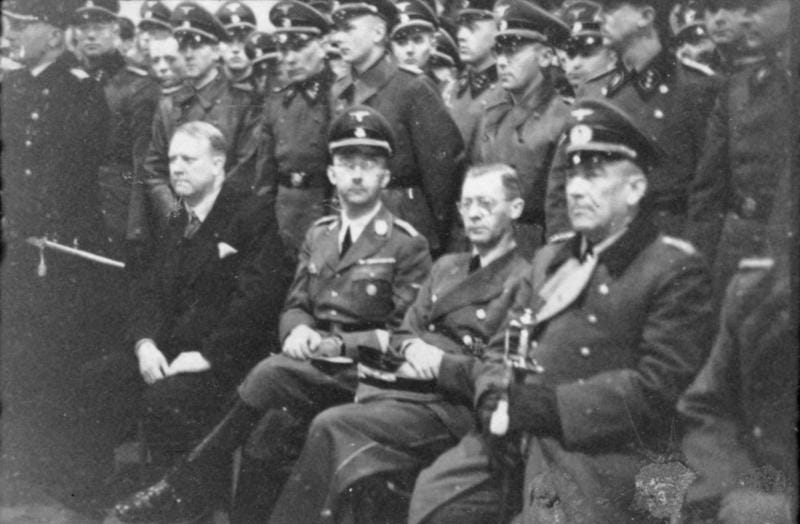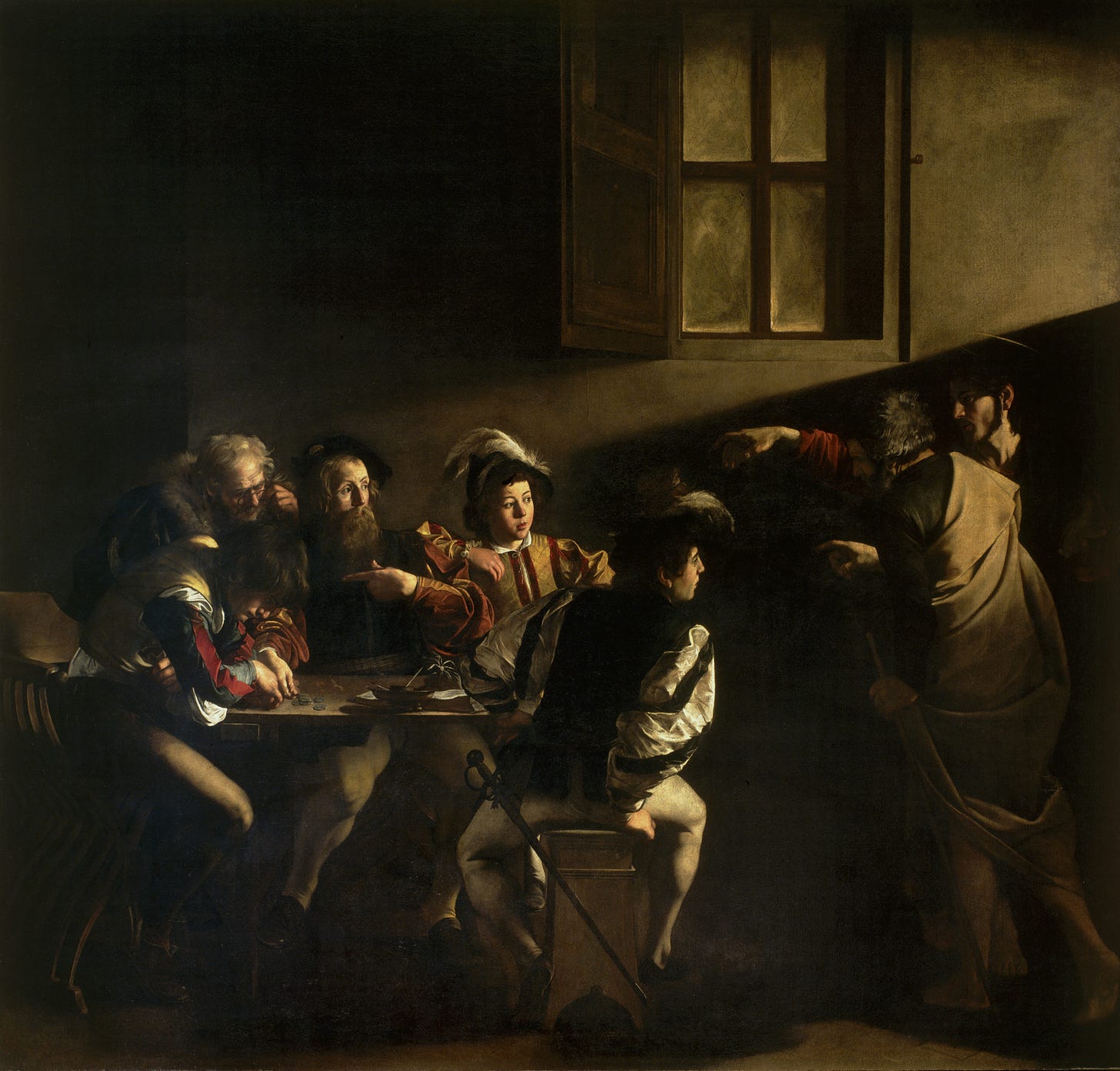The word ‘quisling’ – meaning ‘collaborator’ – is taken from the name Vidkun Quisling. He was a Norwegian fascist who had attempted to overthrow the Norwegian government on the day the Germans invaded in 1940. Two years later, on the establishment of a puppet government in 1942, Quisling was made president (or Head Puppet). When the fortunes of war turned, Quisling was arrested as a traitor, tried and executed by a firing squad on 24th October 1945.

St Matthew, or Levi, to give him his Jewish name, was a quisling. He collaborated with the Roman occupying forces, collecting taxes on their behalf – or at least paying for the privilege of collecting taxes. He may have been feared, but he would also have been despised.
Yet Jesus called Matthew the quisling to follow him. Matthew records it in his own gospel in one solitary verse:
As Jesus passed on from there, he saw a man called Matthew sitting at the tax booth, and he said to him, “Follow me.” And he rose and followed him.
It is easy to take this for granted. We are so familiar with the name of Matthew. 145 churches in England bear the name ‘St Matthew’. He is celebrated in the Church of England on 21st September. He wrote the first magisterial book of the New Testament, one of four gospels about Jesus Christ.
Jesus called fishermen in the same way. They left their nets to follow Jesus. But Galilean fishermen who smell of lakes and talk with strong regional burrs are one thing. A Jewish tax collector who collaborates with the Romans is quite another. But Jesus calls him all the same.
Matthew not only responds immediately, but becomes one of the Twelve. Could there be a higher honour for a mortal man? (The highest honour for a mortal woman, of course, is to give birth to the saviour of the world.)
The Scandal of the Quisling
Have we missed the scandal of God’s grace to this quisling? We need to retrieve this grace in our age of guilt by association. Think of a pariah. Who would you least like to be seen with in public? He or she would be accepted by Jesus.
Today, Jesus would be called on to distance himself from Matthew or disavow him. In fact, in the next part of Matthew’s gospel, Jesus’s disciples are challenged by the respected Pharisees – the elite class of ‘good people’ who gave money to all the right charities and have all the relevant pronouns on their Twitter handles. They demand to know:
“Why does your teacher eat with tax collectors and sinners?”
In other words, disavow these quislings! Or perhaps this is being done behind the scenes. These are skilful political and religious operates, balancing all kinds of factions and interest groups.
The same is just as likely to happen today. We don’t believe public professions of faith. A notorious public sinner comes to faith and everyone rolls their eyes, and dismisses the conversion as ‘convenient’. Welcoming the quisling won’t just get you public fury. You may get private comments, commending you for your grace, but brows will be furrowed with concern about the effect this might have on the support base and one or two larger donors.
But Jesus turns everything – include respectability – on its head. Jesus’s famous sermon in Matthew’s own gospel is the Sermon on the Mount. He says the meek shall inherit the earth. He tells us to turn the other cheek. Love your enemies! Everything is backwards. So it is not that Christ is guilty by his association with us. Quite the reverse. We become innocent by our association with him.
We see this clearly when Jesus touches lepers. Ordinarily, this wound would make Jesus unclean, fit only to be cast out until he had been examined by the temple priests and allowed back into society. When lepers touch Jesus, as one does in Matthew 8:1-4, the leper doesn’t make Jesus unclean. The leper receives Jesus’s cleanliness. Any minute now, Jesus might raise someone from the dead! He does exactly that in Matthew 9:18-26 after someone had a ‘quiet word’ with the disciples about Jesus’s problematic behaviour.
The True Zeitgeist
Jesus offers what the zeitgeist cannot and will not: forgiveness. Make a mistake in public and your grovelling apology will deemed insufficient and not accepted. If it is, your sins will never be forgotten. We should not be surprised at this. What – or who – is the ‘spirit of the age’ or ‘the prince of the power of the air, the spirit that is now at work in the sons of disobedience’ (Ephesians 2:2) if not the devil himself? He is the accuser, not the forgiver. Jesus has come to destroy death. Just before Matthew is called, Jesus calms the storm, drives out demons and heals a paralytic – after he has forgiven his sin.
The Calling of Matthew has been captured by many artists, but I’m especially intrigued by the one that has hung in the Church of San Luigi dei Francesi in Rome since it was painted it about 1600. The painter is Caravaggio. He was the second choice to be the artist. Perhaps he wasn’t first choice because of his reputation as a brawler, prone to violence and fits of rage. He was in and out of jail for violent offences, and eventually had to leave Rome for killing a man in a fight. And yet, he paints this:
Look at how the light streams in from behind Jesus onto Matthew who is pointing at himself, staggered to have been chosen. Jesus isn’t waiting for an answer. Look at Jesus’s feet and you will see he is heading to the door.
How is forgiveness for someone like Matthew even possible? Look at the window above the hand of Christ. A cross is hidden in plain sight.
Caravaggio understood that Christ came for tax-collectors, sinners, quislings and murderers. Will we forgive those who seek forgiveness as Christ freely forgave?
Next week, it’s Michaelmas. Have you ordered your goose? I’m not even joking.
And did you see what I wrote earlier this week? It’s odd but intriguing, I think!
Why I Think Jazz Cow Understands the Secrets of the Universe
It seems unlikely the meaning of life should be revealed to us by a cow that plays the saxophone. The cow is called Jazz Cow, the eponymous hero of a new animation by John Lumgair, and written by yours truly. But life is full of surprises.






